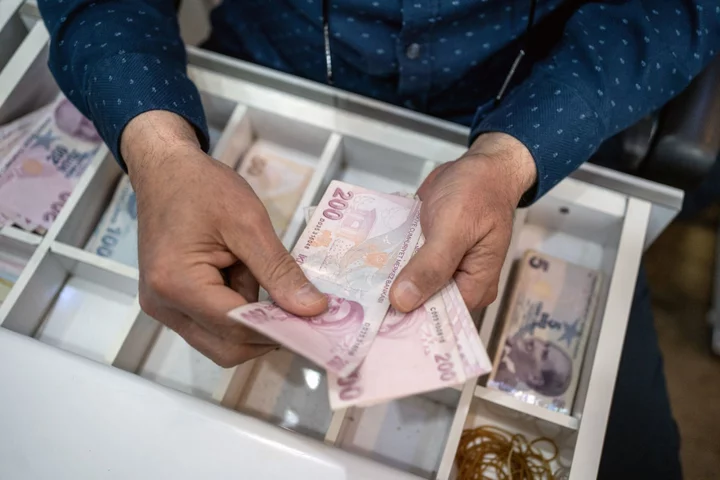Turkey’s currency weakened to a record low amid concerns about external financing needs, while stocks rallied as investors bet President Recep Tayyip Erdogan’s new cabinet could steer the country toward more orthodox economic policies.
The lira slumped as much as 1.2%, the most among emerging-market peers, to 20.3544, extending its decline to a sixth day. A key concern for traders is Turkey’s external financing, with the country having depleted its foreign-currency reserves and with more than $200 billion of debt payments coming due.
Meanwhile, the Borsa Istanbul Banks Index, a gauge that tracks shares of Turkish lenders, surged as much 9.6% and was trading 9.3% higher as of 11:15 a.m. in Istanbul, on course for its best daily performance since May 11. The broader Borsa Istanbul 100 Index was up 3.5%.
Erdogan met Mehmet Simsek, a market-friendly former finance minister, in the capital Ankara on Monday. The president is expected to announce a new cabinet as early as Friday.
READ MORE: World Tries to Read Erdogan for Signs of Policy Shift in Turkey
The meeting has fueled expectations that Simsek may return to Erdogan’s administration and help steer the economy toward more orthodox economic policies. At the same time, a shift in economic policymaking may mean government steps to support the currency get scaled down, said Ulrich Leuchtmann, head of currency strategy at Commerzbank AG.
“There is a risk that the lira will not be supported to the same extent going forward and that the depreciation pressure that accumulated over the past months might be unleashed,” he said. Even so, the speed of the depreciation would remain hard to predict, he said.
Turkey’s sovereign dollar bonds are set to post the worst monthly losses in emerging markets. The notes have lost 5.8% this month, compared with the 1.6% average loss for emerging-market dollar bonds, according to a Bloomberg index.

